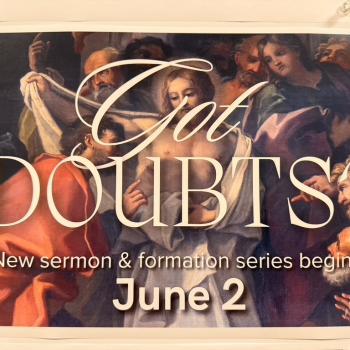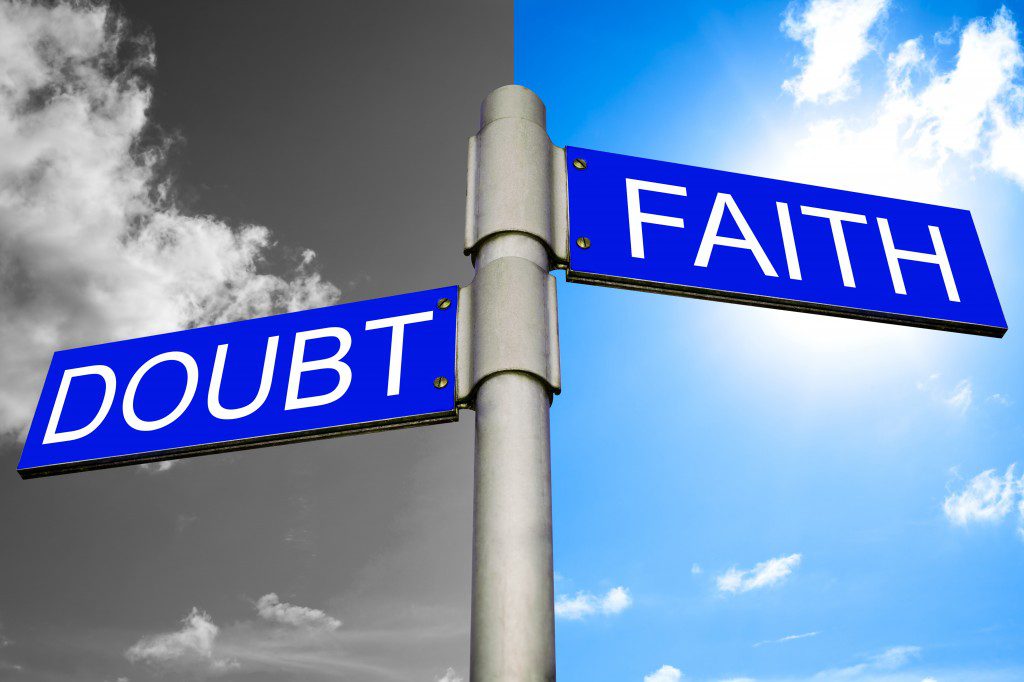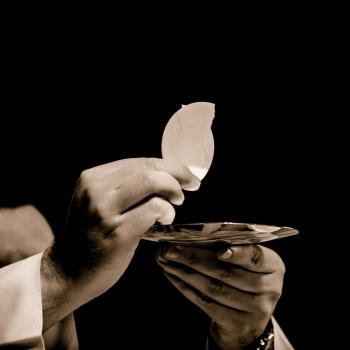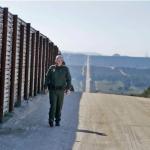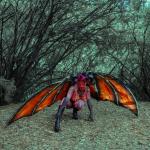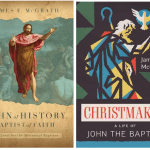
Throughout the summer, my wife — The Reverend Canon Natalie Van Kirk — and I have been preaching a series on the subject of doubt. We have been addressing both the subject of doubt itself and the questions that are often the source of trying questions for Christians, as well as others. Obviously, none of these articles are exhaustive but we hope that they will be a helpful stimulus to your own thinking.
Natalie writes:
I think I was five, perhaps six, when I conducted my first funeral. There were five mourners, my sister and me, our two playmates from down the road–all scruffy, dusty, and hot–and my grandfather, dressed in his ironed and creased khaki work pants and shirt. My mother took some photos, but I am certain she was not mourning the deceased. The deceased was a crow.
“Why were we having a funeral for a crow?” you may ask. Well…I will explain, but I ask you to bear in mind that it was long ago and far away, and I grew up very much “out in the country.” Life was different and not the least suburban.
When my mother and her brothers and sister were young, they had had a pet blue jay that would fly in and out of the house. Blue jays are intelligent birds and can learn to be very comfortable around humans. My grandfather had found the jay as a fledgling and brought it home to be hand fed and semi-domesticated. The jay’s favorite trick was to steal butter from the butter dish, if someone was absent-minded and left the butter uncovered.
That’s all I remember of the blue jay stories, but when my grandfather was living with us, he came home from a walk with a fledgling crow. Now, in case you didn’t know, blue jays and crows are cousins. Jays have the advantage of being prettier, but crows are much smarter. My grandfather thought it would be wonderful for us to have a pet crow. My mother was much less enthusiastic, especially about having a bird fly through the house.
The crow, however, failed to thrive on a diet of corn meal mixed with bacon fat and regular eyedroppers of water. Thus, we came to the funeral. We put the crow in a shoe box, wrapped in an old scrap of fabric. My grandfather dug a hole at the edge of the garden. I read the Twenty-third Psalm from my Child’s Book of Psalms, we prayed that God would take the crow to Heaven or wherever it was that crows went when they died, and then we filled in the hole. The funeral was complete, and the crow sent off this mortal coil with appropriate prayers and rites.
I was only five or six. I had been to viewings at the funeral home, but so far as I know not yet to a funeral. I understood that people and animals all died and in Sunday School or a sermon had probably heard about Heaven. But even then, I understood that when we died, we were in the hands of God.
That is the first thing we should hold fast to when we think about death: When we die we are in the hands of God. The God who, according to the psalmist, knits our inmost being together, who knows our thoughts before we utter them, who loves us even before we were born. The God who loves us enough to become like one of us. The God who shows us in the life, death, and resurrection of Christ that His greatest desire is to heal us, to forgive us, to re-form us, and bring us back into relationship with Him. It is this God who, through the work of Christ, calls us his sons and daughters.
If we are to know Heaven, it will be in direct proportion to our desire for and commitment to that relationship.
God is not, however, an enabler. He is not like the parent who constantly overlooks, pretends not to see, and makes excuses for the child who is an addict, a thief, dishonest, unloving, and disrespectful. Almost all of us, at one point or another in our lives, take advantage of God’s great love for us—pursuing our idols, lying to ourselves, one another, and God, cheating, stealing, doing that which destroys not only our own lives, but the lives of others.
We take advantage of God’s love for us and abuse the mercy offered us. We even reject relationship with God to make ourselves the god of our lives, telling ourselves that we know what is best for us, that we do not need healing or forgiveness. God does not save us from the consequences of such behavior. Like a parent dealing with a child who is an addict, God knows we cannot be healed and freed until we desire such healing and freedom.
If we know Hell, it will be in direct proportion to our desire to escape from God and be our own gods.
That said, I doubt seriously that either Heaven or Hell are places, not at least in the sense that we ordinarily think of a place. They are not spacial realities to which our souls are sent at the moment of death. They are something quite different.
Now, I know that many of you were brought up to believe that Heaven and Hell are places to which your soul is sent at the moment of death and that the location was determined by your behavior in this life. Some of you may even have been brought up to believe that God decided whether you were saved or damned before the creation of the universe. There are great problems with those ideas. Not least that they can make God seem vindictive and cruel.
So what are Heaven and Hell?
First, Heaven: I know that the Revelation to Saint John talks about the streets of Heaven being paved with gold, and that Jesus says in His Father’s house there are many dwelling places. I know that the Revelation speaks of an endless banquet beside a river of living water where there will never be sickness, pain, grief, starvation, drought, or any of the things that make life miserable. John also says, our joy will be more complete because all of this happens in the presence of God and Christ.
Let’s think about this a bit: Jesus speaks to his followers in parables and metaphors in order to explain the unexplainable. But, imagine, if you lived in a world where streets were paved with dung, dust or mud, sewage, garbage, and dead animals; a world where not everyone had shelter from the biting cold of winter or the roasting sun of summer; where children died before they could walk, and mothers died giving them birth; where disease deformed bodies, and killed people by the dozens or thousands; where starvation and drought went hand in hand. What would Heaven need to look like for you?
The metaphors are a way of describing a perfect world. What’s more, it is a restored and renewed earth where this kind of Heaven is to be found—not some celestial place completely separated from our reality. This is why both Jesus and Saint John use those familiar images. But that doesn’t mean that heaven is no more than that.
The most important point for us is that the joy of that world is found in being in the presence of God, knowing God’s love, desire, and delight in us. Of knowing this Earth as God created it to be. The true delight and joy of some experiences in this life are but a little sample of the reality of that delight and joy.
As for Hell: When Jesus talks of the fires of Gehenna, he is talking about the ever-smoldering city dump down the hill from Jerusalem – a dump where dead bodies, garbage, and every unclean thing imaginable would have been thrown. To be discarded with garbage is to be separated from God and all that was good. Likewise, Sheol or Hades—a dark and shadowy place of endless wandering without purpose or relationship, bereft of all that is good.
Like the joy and delight of Heaven, the pain of Hell is often experienced in this life as a consequence of our actions. Just ask someone who has been addicted, who has betrayed others, who lied to those who trusted them. They have known their own personal Hell. Even those who never seem to suffer for the wrongs they have inflicted on the world will pay a price. Their souls will be distorted, their relationships broken, their resentment and anger become the only feelings they know. In the end, they become something less than human.
So, if Heaven and Hell are experienced in this life, then what happens when we die?
Last week, Fr. Fred talked about thinking of this life as one tasked with climbing a high mountain at the top of which one can see that God is found wrapped in cloud and light and glory. This life and the life after our mortal death are, in fact, the same life. The journey does not end. The mountain is ever before us beckoning us on.
The metaphorical image comes to us from Saint Gregory of Nyssa and it envisions Mount Sinai as the mountain. If you have ever been to the Sinai you know that is barren, hell-scape of sand, rock, and very little water. Mount Sinai is found in the center of the barren, rocky mountains at the southern tip of the Sinai peninsula. At its base is the tiny monastery and village of Saint Catherine’s—one of the few places in the mountains where there is water and the legendary site of Moses’ burning bush. It is not an easy place to reach.
The fact that it is not an easy place to reach is part of the point. The difficulty takes seriously the suffering and sin of this life, the challenges we face, the hazards and detours we create for ourselves or that are inflicted on us. We here at Good Shepherd live extremely sheltered lives, but for most of the world and most of history, life has been hard. Beyond our imagining hard. The difficulty of the climb fits with reality. Life can be very hard.
According to Saint Gregory, at death all of us find ourselves at some point on the journey to Sinai. Some of us have further to go than others. Some of us need to be prepared for the journey. So, what happens?
Maybe, just maybe, it is something like this. At death God’s grace gives a clear vision of what awaits us at the top of the mountain. Because we are created to love, know, and worship God and live in union with God forever, that vision will create in us a longing like we have never known. If we had ignored God or rejected Him in this life—the further we were from God in this life—the more unbearable the longing will be. But all of us will want to climb that mountain.
The beginning of the journey will be like walking across the burning sands of the Sinai, understanding at last, all that we have done for which we have not sought forgiveness and the ripple effects of that wrong in the lives of others. It will be a full knowledge of the responsibility and grief of the lives we have been given to care for—ours and others. It will clarify how often we have chosen other gods. This part of the journey will strip us of all illusions and it will be painful. The Psalmist describes it as being gold in a crucible, melted, refined, and the dross or impurities poured away.
As we get closer, there is healing. Healing of the broken places caused by others and healing of the broken places caused by our own choices and actions. If you have ever needed physical therapy, you know that sometimes achieving complete healing can be a difficult process. But, it is God’s intention that the healing be complete. It will require reshaping, formation, and strengthening of all that makes us who we are.
And then, for those of us whose understanding is incomplete or for those who never knew much about God, there is instruction. A knowledge of who God is, who Christ is, what has been revealed about the nature of God in the Incarnation, and what human beings were created to be. At this point we will be ready to become like the burning bush—able to contain God and to be contained in God without being consumed.
There may be some, I suppose, who will refuse the grace, refuse to see, and refuse to make any part of the journey. It will be their choice to remain in the desert. It will not be God’s desire for them. But, should they so chose, there they will sit, separated from God and from all others. Just the sun, the sand, and the vipers for company.
In the Revelation, Christ says He is the one who was, the one who is, the one who is to come. It is a way of saying that in God, past, present, and future are one. To us, because we are bound by time—a metaphor our humanness cannot escape—this journey may seem eternal. But, to God, the journey has, is and will be complete. When we die, we are in the hands of a loving God who created us and wants only that which will make us whole and as glorious as humans were created to be.
What we do in this life matters. It will determine how much of the journey there is to complete. Maybe only the Saints, and the animals—even crows—will find themselves instantly in the presence of the glory of God. The rest of us most likely will need to make sure we have a good pair of hiking boots.







